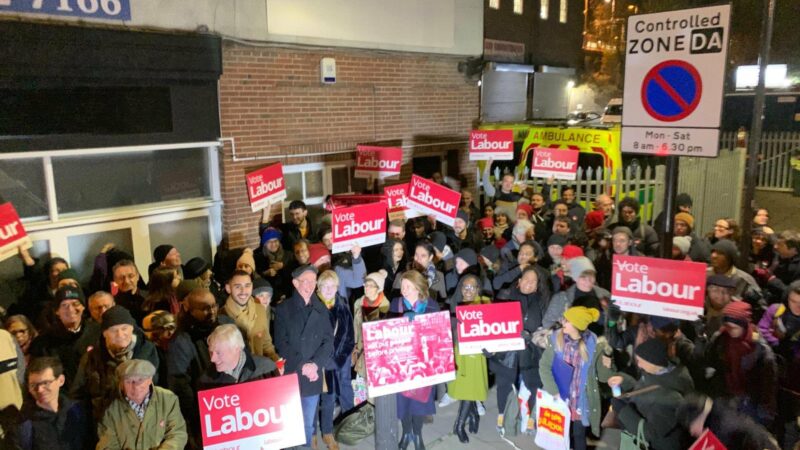
“I’ve never seen it like this,” Labour’s Harrow East candidate Pam Fitzpatrick tells me. “I’ve been involved in the Labour Party for a long time, and I’ve never seen so many people come to help. Even in 2017 – it wasn’t like this.” She is genuinely surprised by the level of support her campaign has received. “People of all ages, all backgrounds. People of all faiths and none.”
Pam says she regularly has over 50 people out canvassing in the evenings, and even more turn up for weekend sessions. As December 12th draws closer, more and more volunteers show up, joining from Harrow and further afield. And the support is much-needed: Harrow East has been represented by Tory Bob Blackman since 2010, but Labour fell short of winning it back by just 1,757 votes at the last election.
Pam is the fourth Labour candidate to go up against Blackman. She’s a councillor in Harrow and has been since 2014. She has also worked locally for years in the voluntary sector giving legal advice, and knows well the issues in the constituency: “I’ve always been political because I’ve worked for various campaigning organisations that give people advice about their rights… It’s always been a question of me assisting people to access justice, and I’ve represented literally thousands of people at tribunals and things.”
But what has made her seek election as a Labour MP now? I ask. “It’s really seeing the impact of austerity on local people that’s driven me to stand,” Pam replies. “It’s that the safety net has been pulled away completely… To the extent that now in Harrow I regularly see people who have serious illnesses, like cancer, have their benefits taken away.”
She talks passionately about the cruel sanctions regime that she’s seen first-hand through her work and as a councillor. “They have no food, no heating and they are then at risk of losing their home, at a time when they ought to be concentrating on their health and getting well. People who have been called up for a work capability assessment at a time when they’ve got a hospital appointment. And if they choose to go to the the hospital appointment, they’re penalised.”
There is also the extreme difficulty that residents in Harrow – like other parts of the country – are facing in terms of housing and rent. Pam explains that the council’s social housing stock is very low and “there’s just such insecurity in the private rented sector and it’s so expensive. The cuts to benefit mean that housing benefit and now Universal Credit don’t cover the level of rent. People are in this constant churn of homelessness.”
These problems are reflected in the doorstep conversations that Pam is having. She tells me that it’s housing, health, education and crime that keep coming up. Not – crucially – Brexit. “It comes up, but you know it’s not dominating in the way that it is in other areas. The community is split, pretty much 50-50 either way, but it’s not the overwhelming issue that’s coming up.”
Does Labour’s policy make sense to people, when Brexit does come up? It does, Pam says, particularly because people here feel the danger in the division caused by Brexit: “In Harrow it’s a really diverse community and we’ve seen a rise in hate crime since Brexit… So at least, I think people really understand the need to bring communities back together. And the Labour Party policy seems to do that.”
I noticed that crime came up several times when I knocked on doors for Pam. She notes: “Crime has again soared in Harrow, as with many other places, because of a combination of things. The cuts to policing – that’s just the most obvious – and there’s been a 60% cut in youth offending services.”
The focus in Harrow East seems to be the impact of austerity felt by residents on the ground. People are talking about the same issues that Pam’s been dealing with for years. And Pam’s advocacy does nothing to hurt her chances here, as people recognise that work. She tells me: “I’ve worked for a local charity giving advice in Harrow for ten years, and I see from there all the issues that are impacting people locally. When I knock on the door, it might be someone I’ve helped.”
But she’s modest when I ask whether her past work is swaying voters: “I don’t think it’s that… as much as I’d like it to be!” She laughs. “I think it’s part of a bigger thing.” Pam describes a recent campaign she was involved with before the election to prevent the closure of a walk-in health centre. “We had a public meeting and from that meeting – we probably had about 60 people – we’ve had people turn up at the door to help.”
People who have never campaigned for Labour before are joining her on the doorstep, she says, or helping out in her office. Many tell Pam they’ve signed up to the party as a result of campaigning, rather than the other way around. “It’s really positive. Because you think, well they’re talking to their family and their friends and it feels like a movement… it’s quite inspiring.”
This ‘bigger thing’ is surely biting austerity. As with many of the places I’ve visited over the campaign, nine years of cuts have left their mark on the psyche of residents. Health centres closing, unaffordable rents, harsh welfare sanctions and crime – these are the topics of discussion here, Pam tells me. Labour’s offer on these ‘bread-and-butter’ issues is strong. But the question will be whether this is enough to tip the scales in this longstanding marginal.




More from LabourList
‘As metro mayors gain power, Labour must tighten political accountability’
Letters to the Editor – week ending 22 February 2026
‘The coastal towns where young people have been left behind by Whitehall’